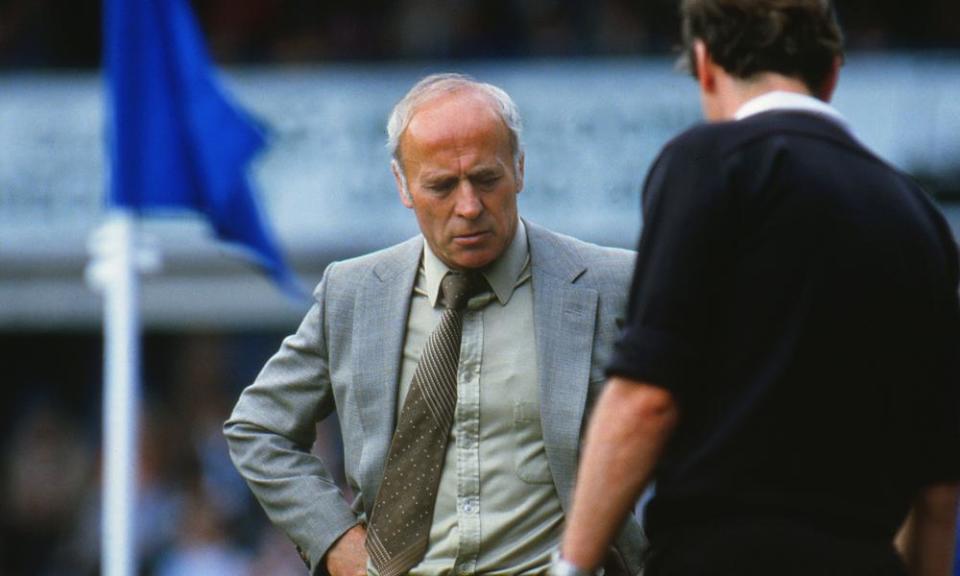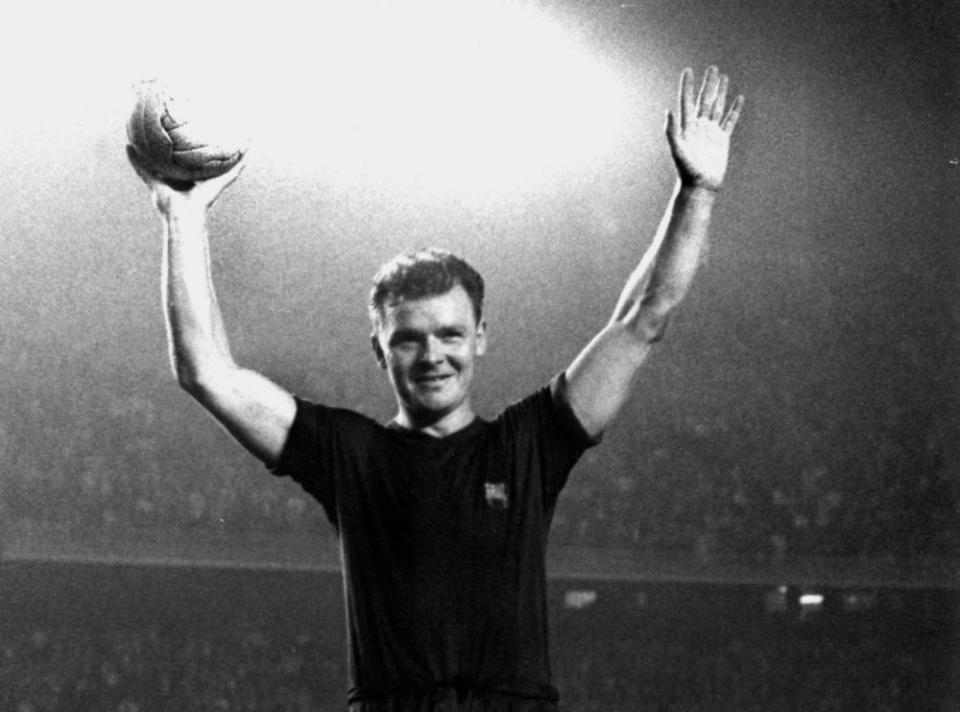Which football managers have crossed acrimonious derby divides?

“Former Liverpool manager Rafa Benítez’s appointment at Everton was surprising. Is there a more jaw-dropping example of a manager crossing an acrimonious derby divide (perhaps even directly)?” asks George Jones.
Andy Grace is a Southampton fan who never forgets. “Benítez, once of Liverpool now Everton? Not even close. Derbies don’t come any more acrimonious than the one on the south coast. Harry Redknapp going directly from Portsmouth to Southampton and back to (his spiritual home) Portsmouth surely takes some beating.”
Chris Richardson puts the spotlight on the West Midlands. “Ron Saunders took Aston Villa to their first (and most recent) top-flight title in 71 years during the 1980-81 season. Having steered Villa to the quarter-finals of the European Cup the following year, he resigned over a contract dispute and relocated 3.5 miles to arch-rivals Birmingham City (also then in Division One). Birmingham’s first home fixture after Saunders’ arrival was a 1-0 loss to Villa during which much of the opposition fans’ singing (to the tune of Bread of Heaven) was ‘Ron Saunders, Ron Saunders, you must be [eff]ing mad’. Perhaps this was warranted because Saunders’ assistant Tony Barton won the European Cup with the Villa team Saunders created, while Birmingham were promptly relegated. Birmingham gained promotion the next season but he ditched them for ever-so-slightly-less arch-rivals West Brom, who were also immediately relegated.”

The north London Derby can provide us with a couple of examples of derby divide-crossing managers. “A good one is Arsenal stalwart Terry Neill,” writes Mitchell Sandler. “Having left Highbury in 1970 to become player-manager at Hull, he impressed enough to become the successor to Bill Nicholson at Spurs in 1974. Perhaps inevitably, following Bertie Mee’s retirement two years later, he was top of a very short list when the Arsenal board looked for a replacement and he jumped at the chance to take the Gunners job.” Meanwhile, Ed Mortimer offers up George Graham. “A former player and manager of Arsenal, he took over at Tottenham [via Leeds]. Apparently Spurs even won some silverware, though it’s a technicality as trophies won with a Gooner in charge clearly can’t be counted.” Oh behave, Ed.
Radomir Antić managed Real Madrid, Atlético Madrid and Barcelona but never moved directly between those clubs and Ernest Mangnall, the owner of a glorious moustache, crossed the Manchester derby divide in 1912. He began a 12-year stint at City having spent nine years at United, where he won two league titles and an FA Cup. He won nothing at City.
Qualifying to play for numerous national teams
“Which player (active or retired) has been eligible to play for the highest number of different national teams?” asks Ben Janeson. “And other than Alfredo Di Stéfano, have any players played for three different national teams (not counting cases such as USSR/Russia or Yugoslavia/Serbia etc)?”
Let’s start with the first part. “Adnan Januzaj was qualified to play for six different national teams (Belgium, Albania, Kosovo, Serbia, Turkey and Croatia), but not England, despite what was said at the time,” offers Jerry Higgins, setting the bar so high that it might take an extraordinary person to beat it.
“Born on a refugee raft, Rio Mavuba was eligible for all of them,” writes Steve Hyde, with perfect timing. Mavuba was born in international waters off the coast of west Africa while fleeing the Angola civil war en route to France, where he settled and earned 13 caps for Les Bleus after turning down the chance to play for DR Congo. And while it might be true that Mavuba could have, theoretically, represented any nation, Fifa’s eligibility rules say a stateless person must have lived in the country they hope to represent for at least five years and demonstrate that the move to the territory of the association was not for the purpose of participating for its representative teams. So, in practical terms, a stateless person is not eligible for any nation until they have settled somewhere for a length of time.”
As for the second element, Milton offers up a near-miss in Daniel Alberto Brailovsky, who played for Uruguay Under-20s, unofficial matches for Argentina and then 18 times for Israel, scoring three goals. But David Walker has another big-name striker to match Di Stéfano: “László Kubala, the famous Barcelona centre-forward, played for Czechoslovakia, his native Hungary and Spain. Like Stéfano, despite playing for three different countries he never appeared in the final stages of either a World Cup or European Championship. Both players were included in Spain’s squad for the 1962 World Cup finals in Chile, but, owing to injury, neither appeared in a match.”

Winning big with a nation you never played club football in
“Despite winning Euro 2020 with Italy Marco Verratti has never played a Serie A game. Has anyone else won major international tournament with their national team despite never having played a top flight game in that country?” asks Dan Almond.
“That happened the day before with a player of lesser stature than Verratti,” writes Thomas Wendt, clearly building up to something. “A little known player called Lionel Messi won the Copa América, despite never playing a club match in Argentina. In the same squad, there was also Aston Villa’s Emiliano Martínez, who has never played a top-flight match in Argentina, having been signed by Arsenal as a youth player.
“Paul Pogba has never played a game in France yet won the World Cup with them. He was signed by Manchester United from La Havre as a youth-team player. And Antoine Griezmann shared the same glory despite having never played a senior game in France. He was signed by Real Sociedad (from Macon in the French sixth division) as a 14-year-old.”
Knowledge archive
“I’ve been wondering for a while what I should call any prospective son to give him the best chance of success at professional football,” wrote Nick Pepper, in August 2010. “So my question is what is the most successful first name and surname in football in terms of trophies and titles won?”
“Although I’m inclined to say that, of Englishmen at least, Robert – shortened to Bob (by) – must top the bill (having provided World Cup success with Charlton and Moore, and exceptional managerial achievements for Paisley and Robson), I’ve no evidence of that,” wrote Robert D Marriott. “The most successful English player in terms of trophies won was Phil Neal, who collected four European Cups, one Uefa Cup, eight league titles, four League Cups, one European Super Cup, five Charity Shields, and one, er, Sherpa Van Trophy [while managing Bolton]. And no end of runners-up medals. What’s more, his surname can be used too, so I’d expect a Phillip George Neal Pepper to be playing for England in about 20 years’ time.”
Can you help?
“We all know of footballers who played cricket, but did any ever compete at the Olympics?” asks Harvey Maybe, presumably meaning in other sports.
Goalkeeper Ronnie Hellström was capped 77 times for Sweden, but didn't win a single trophy over his 18-year career.
Striker Andrzej Szarmach played 11 WC matches for Poland, but didn't win a single trophy over his 20-year career.
Have any other top players been as unsuccessful?— Ben Janeson (@BenJaneson) July 20, 2021
“With Rogelio Funes Mori making his debut for Mexico this week, does this make him and his brother Ramiro the first identical twins to play for different national teams?” wonders Logan Casey.
@TheKnowledge_GU As it's that time of the calendar when 'A Trialist' makes his regular pre-season appearances, i wondered if (or how) other nations present this curiosity!? 😋
— Sir Sidney P (@sirsidneyp) July 17, 2021
Wales are currently ranked 17th in the FIFA Rankings. Looking at only European teams they are 12th.
The Welsh League is ranked 51st in Europe. 39 places lower.
Is that the biggest gap between a national team's ranking & a national league's ranking?— Jerry Higgins (@JerryHiggins86) July 20, 2021
Email your questions and answers to knowledge@theguardian.com or tweet @TheKnowledge_GU.

 Yahoo Sport
Yahoo Sport 





































